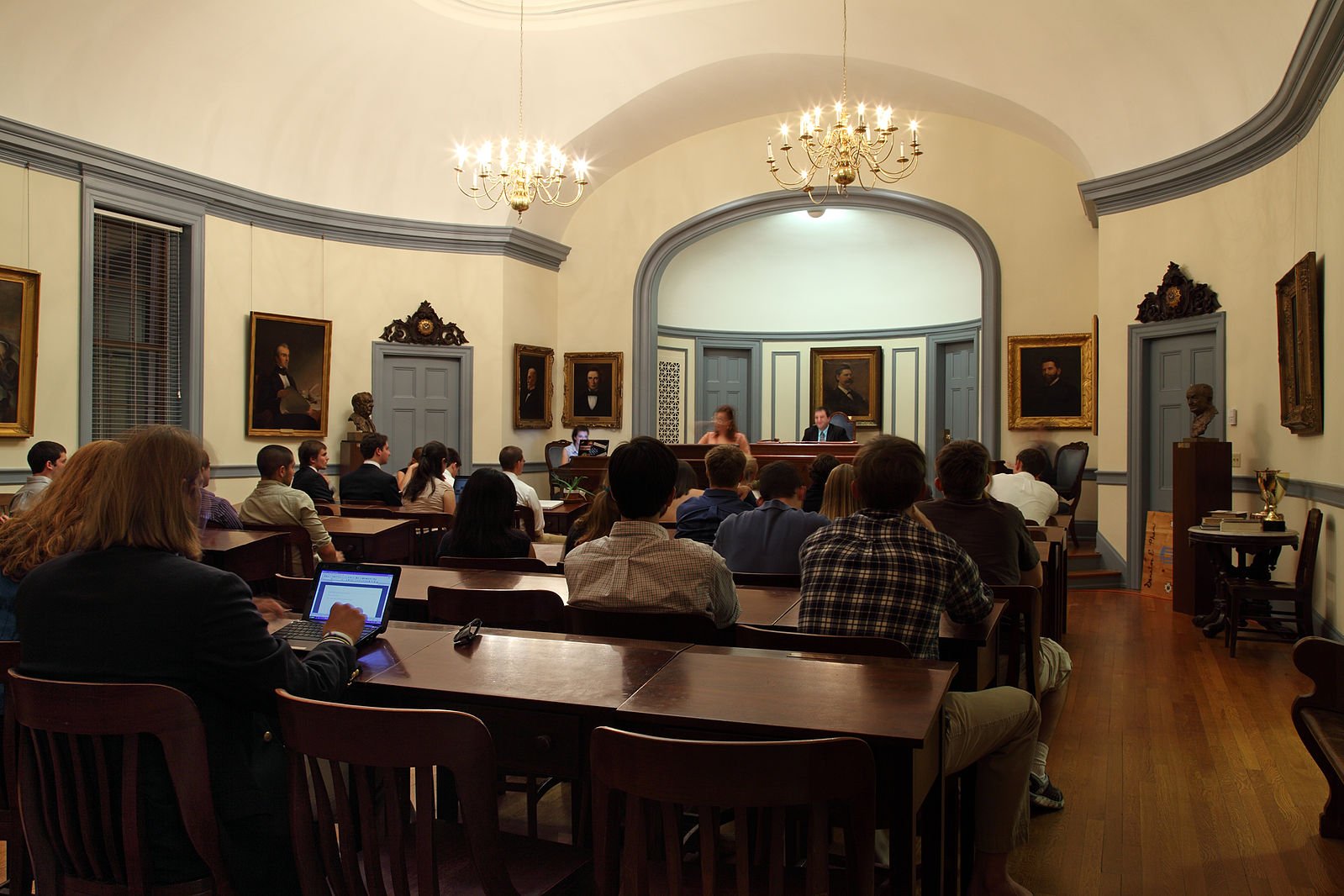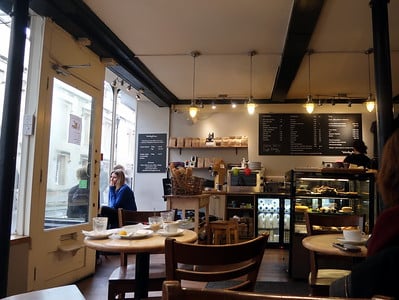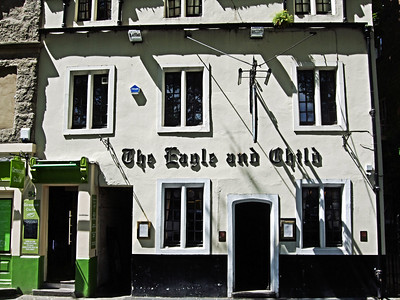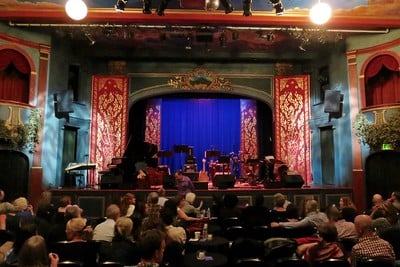Drama
Oxford student drama is probably pretty different from drama at school — there’s a really exciting atmosphere, you can try new things, and there are big projects to take on. Everything operates under the umbrella of OUDS (Oxford University Drama Society), which holds committee elections every year. Students start their own production companies and there are opportunities to take on all sorts of roles beyond acting, from directing and composing to lighting designing and marketing.
How does it work?
The easiest way to find drama opportunities quickly and easily is by joining the OUDS Facebook group and signing up to the newsletter. Through these platforms, students post auditions, crew call-outs, ticket links, and more: it’s really easy to find like-minded people to start a project with. If it’s auditions you’re looking for, these can also be found on the OUDS website’s audition portal. You will usually be asked to read a monologue or two, either from the show or of your own choice, and for musicals you’ll likely be asked to sing and dance as well. Over the past year many auditions were by self-tape (filming yourself in your own time) and some productions will likely continue doing so this year. If you’re applying for roles like Director, Producer, Marketing, or Design/Tec, you’ll likely need to send an email or fill out a Google form, then attend a short interview.
If you’d like to put on your own production, you’ll need to start a production company — either by yourself or with a friend or two, all you have to do is come up with a fun name and register on the OUDS website and you can bid for venues and get funding. But what’s bidding, you may ask? Most Oxford venues ask production companies to put together a ‘bid’ for their theatre, where the Director, Producer, and other collaborators write about the plan for the show. It’s all a lot less scary than it sounds, and everyone in Oxford drama is happy to help.
Venues
There’s a wide variety of venues open to student productions. The smallest of these, and the best for beginners, is the Burton Taylor Studio, a ‘black box’ style space that is great for small plays. The Michael Pilch is a similar, slightly larger space, reopening this Hilary term. For bigger productions, there’s the Keble O’Reilly, an auditorium that’s recently hosted shows like Chicago. The largest and most professional space available is the Oxford Playhouse, which has one student slot per term. There’s also the North Wall, which hosts new writing in particular. Many colleges have their own performance spaces, from auditoriums to halls and even chapels, and many also host ‘garden plays’ in their grounds in Trinity term.
Cuppers
Your first experience of Oxford drama is likely to be Cuppers, the freshers’ drama competition. Each college puts together a play that’s a maximum of thirty minutes long, and every role is filled by first years. The plays are often comedy and often written by students, and prizes range from Best Tech and Best Actor to ‘Spirit of Cuppers’. Last year, the competition was held for Zoom plays, proving that theatre will always find a way!
What happened in the pandemic?
For the past year it’s been very difficult to do any in-person theatre. However, Oxford drama has done anything but slow down. There have been many radio plays, filmed monologues, Zoom plays, and more. The annual New Writing Festival went ahead as an online magazine and Zoom reading, Cuppers moved to Zoom, and lots of new production companies were formed.
What about outside of Oxford?
Every year, student production companies take productions to the Edinburgh Fringe Festival, as well as frequenting the Camden Fringe and the National Student Drama Festival. Even in the past year, two shows that began in Oxford had performances at London venues, giving students valuable — and exciting — theatrical experience!
Top Tips
- Try not to be discouraged if you don’t get the first role you audition/apply for! With so many students in Oxford there are often lots of people wanting the same role. There will be plenty of shows to get involved in every term so you’ll find something for you soon enough!
- Don’t be afraid to try new roles! So many people come to Oxford wanting to act, but instead find a passion for producing, designing, marketing, or something else entirely different. It’s a good idea to try out a range of roles so you can work out what suits you best.
- Be friendly! We all know that drama can get competitive every now and then, but most people just want to get along. Treat things like auditions as a way to make friends, not rivals. The more people you’re friends with, the more opportunities they might lead you to.
- Use your voice. If you have an exciting idea, or if you think something isn’t working, speak to whoever is directing/producing your production, or to someone on the OUDS committee. We all want our shows to be as good as possible. If your concern is welfare-based, most shows will have a Welfare Officer, as does OUDS.
- If you want to perform, it can be handy to come to Oxford with some audition monologues learnt and ready to go, along with a song or two if you’d like to be in musicals.
- All Oxford students have access to Drama Online Library through your SOLO (library) log in, which is incredibly useful for finding monologues and reading scripts of plays you might like to put on.
Drama Glossary Terms
Oxford drama can sound like it’s own language sometimes, and there’s a lot of acronyms! Here’s some key terms to help you along…
AD: Assistant Director
AP: Assistant Producer
BT: the Burton Taylor Studio, one of the student theatres
Bid: a document put together by a student production company applying for a venue
Callback – a second round of auditions
Call-out: – people will post call-outs on the OUDS group looking for crew members for their show
Cuppers: – the Freshers’ drama competition
Pilch: – the Michael Pilch studio, a small theatre attached to Balliol College
OP: – the Oxford Playhouse, the largest student venue
R&D: – Research and Development: a drama project that isn’t a finished show
Creative Writing
If you’re interested in writing stories, poems, scripts, or anything that falls somewhere between those categories, there are lots and lots of opportunities at Oxford to have your work published, get feedback, find collaborators, and attend related events. Through a range of societies and publications, there’s something for everyone, and new magazines, groups, and more are being set up all the time.
Oxford University Poetry Society has been running since the 1940s and regularly hosts workshops, which are a great opportunity to develop your own writing regardless of experience level. The society also has a termly magazine called The ASH which publishes student poetry and art.
There’s also State of the Arts, a student-run group to read and discuss new writing, which is a great opportunity to meet other writers and get feedback on your work. They hold really regular writing nights.
There are so many magazines, newspapers, and anthologies to submit creative writing to at Oxford. Here is a list of the largest:
The Isis Magazine
The Isis is known for its beautifully designed print magazines, publishing student poetry, fiction, photography, artwork, essays, and articles. There are submission periods for each issue, as well as open submissions for the website. Most pieces submitted go through a fairly lengthy editing process, meaning the Isis is a great publication to submit to if you have a piece you’re really excited about but want a chance to workshop and develop.
Oxford Review of Books
The ORB, as it is often abbreviated to, publishes poetry, short stories, book reviews, essays, and interviews, with a more literary style. Submissions are open to the general public, and the ORB has published several widely successful poets; it’s a really exciting place to see your work printed. The ORB also holds a termly Poetry Night where well-known poets are invited to read and be interviewed: these have recently involved Anthony Anaxagorou and Pascale Petit.
Cherwell
Cherwell’s creative writing section is called The Source, which is always open to submissions of poetry, prose, and anything in between. These are published regularly on the website, and 2-3 pieces appear in print in every issue. The video team in the past have also produced animated videos of poetry readings and their accompanying artwork.
The Oxford Blue
The Oxford Blue, a digital student publication, recently started an arts publication called The Blueprint, and its regular issues all revolve around a theme — these have recently included Body, AI & Technology, and Queerness.
Industry
Another magazine, Industry is known for its arty, alternative vibe and creative events. The termly issues include not only creative writing but art, fashion, music and more.
Zines
Oxford also has a thriving zine scene. Zines are smaller, independent publications, traditionally hand-made/printed with a cut-and-stick feel but now appearing in all kinds of creative formats. Some successful Oxford zines include Cuntry Living and That’s Hot, and there’s always something new happening!
Image credit: Fabrice Florin via Flickr (CC BY-SA 2.0).











